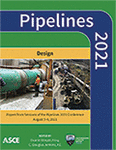An Enhanced Linear Project Resource Utilization Based on Line of Balance Technique
Publication: Pipelines 2021
ABSTRACT
One of the fundamental goals of utilities project management is increasing the efficiency of using resources and reducing waste. Enhancing resources utilization in linear construction projects can be achieved by levelling the project resource and/or reducing the required number of resources to accomplish the project. This might enable construction planners to address problem of resources limitations and avoid the additional costs incurred due to the poor resource management. Accordingly, this paper presents the development of a new single-objective optimization model for scheduling linear construction projects based on the line of balance technique that minimizes the required number of the needed resource for the project while maintaining the project duration. The optimal generated schedule of the developed model identifies optimal start time and optimal number of construction crews of each activity. To simplify the application of the developed methodology, a computerized model is created by optimization tool “GANetXL” in Excel. A case study adopted from the literature is analyzed to validate the developed model and to illustrate its capabilities compared to the existing ones.
Get full access to this article
View all available purchase options and get full access to this chapter.
REFERENCES
Agrama, F. A. E. (2011), Linear projects scheduling using spreadsheets features, Alexandria Engineering Journal, 50(2), 179–85.
Ammar, M. A. (2013), LOB and CPM integrated method for scheduling repetitive projects, Journal of Construction Engineering and Management, 139(1), 44–50.
Arditi, D., Sikangwan, P., and Tokdemir, O. B. (2002a), Scheduling system for high rise building construction, Construction Management and Economics, 20(4), 353–64.
Arditi, D., Tokdemir, O. B., and Suh, K. (2002b), Challenges in line-of-balance scheduling, Journal of Construction Engineering and Management, 128(6), 545–5.
Damci, A., Arditi, D., and Polat, G. (2013a), Resource leveling in line-of-balance scheduling, Computer-Aided Civil and Infrastructure Engineering, 28(9), 679–92.
Florez, L. (2017), Crew allocation system for the masonry industry, Computer-Aided Civil and Infrastructure Engineering, 32(10), 874–89.
Georgy, M. E. (2008), Evolutionary resource scheduler for linear projects, Automation in Construction, 17(5), 573–83.
Hegazy, T., and Kamarah, E. (2008), efficient repetitive scheduling for high-rise construction, Journal of Construction Engineering and Management, 134(4), 253–64.
Hegazy, T., and Wassef, N. (2001), Cost optimization in projects with repetitive nonserial activities, Journal of Construction Engineering and Management, 127(3), 183–91.
Hegazy, T. (2005), Computerized system for efficient scheduling of highway construction, Transportation Research Record, 1907, 8–14.
Hegazy, T. (2006), A computerized system for efficient de-livery of infrastructure MR&R programs, Journal of Construction Engineering and Management, 132 (1), 26–34.
Sarraj, Z. M. A. (1990), Formal development of line-of-balance technique, Journal of Construction Engineering and Management, 116(4), 689–704.
Su, Y., and Lucko, G. (2016), Linear scheduling with multiple crews based on line-of-balance and productivity scheduling method with singularity functions, Automation in Construction, 70, 38–50.
Tang, Y. J., Liu, R. K., and Sun, Q. X. (2014), Schedule control model for linear projects based on linear scheduling method and constraint programming, Automation in Construction, 37, 22–37.
Wang, C. H., and Huang, Y. C. (1998), Controlling activity interval times in LOB scheduling, Construction Management and Economics 16 (1), 5–16.
Yi, W., and Wang, S. (2017), Mixed-integer linear programming on work-rest schedule design for construction sites in hot weather, Computer-Aided Civil and Infrastructure Engineering, 32(5), 429–39.
Damci, A., Arditi, D., and Polat, G. (2013). Resource leveling in line-of-balance scheduling. Computer-Aided Civil and Infrastructure Engineering, 28(9), 679-692.
Prasad, T. D., and Park, N. S. (2004). Multiobjective genetic algorithms for design of water distribution networks. Journal of Water Resources Planning and Management, 130(1), 73-82.
Information & Authors
Information
Published In
Copyright
© 2021 American Society of Civil Engineers.
History
Published online: Jul 29, 2021
Authors
Metrics & Citations
Metrics
Citations
Download citation
If you have the appropriate software installed, you can download article citation data to the citation manager of your choice. Simply select your manager software from the list below and click Download.
